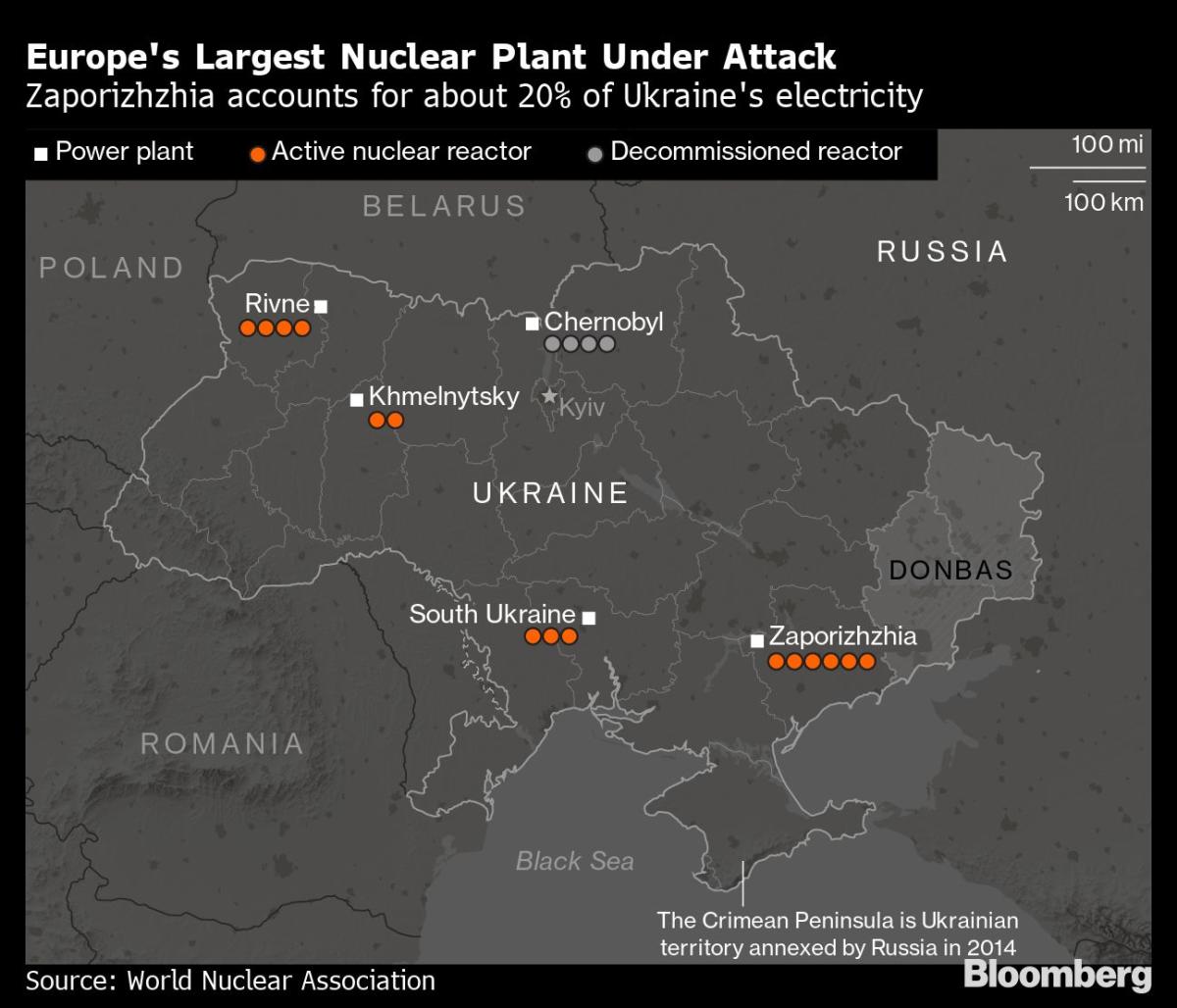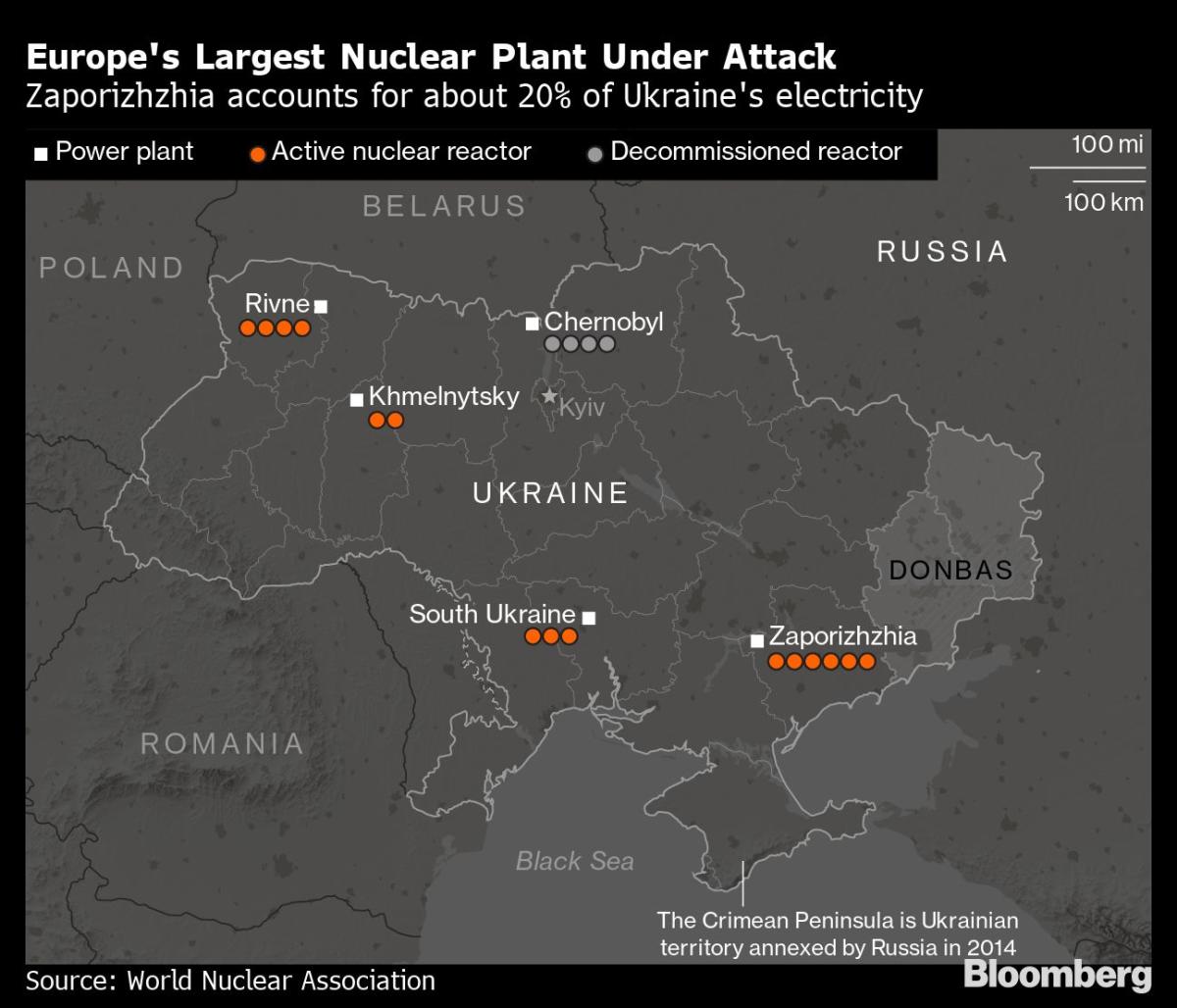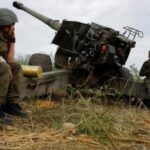
(Bloomberg) — The United Nations atomic watchdog agency called for the establishment of a security zone around a Russian-controlled nuclear plant in Ukraine after reporting damage at the facility, warning that fighting poses a “constant threat” to safety.
Most Read from Bloomberg
Russian President Vladimir Putin’s top economic policy official confirmed that the government prepared an internal report that the country may face a deeper recession than publicly acknowledged, Tass reported, after Bloomberg published the estimates.
Elsewhere, Russia’s Gazprom PJSC said it will shift its contract supplying gas to China to rubles and yuan from euros, as the Kremlin steps up efforts to move trade out of currencies it considers “unfriendly” amid US and European sanctions. Putin was in Russia’s Far East to attend military exercises that include Chinese forces, as well as to visit the Eastern Economic Forum in Vladivostok.
(See RSAN on the Bloomberg Terminal for the Russian Sanctions Dashboard.)
Key Developments
-
Ukraine’s Premier Wants War to End Soon as Time Favors Russia
-
Russia Privately Warns of Deep and Prolonged Economic Damage
-
Gazprom to Shift Gas Sales to China to Rubles, Yuan From Euro
-
EU Ministers May Set Price Cap on Russian Gas, Spain Says
-
Gazprom Starts Producing LNG at Plant Near Nord Stream Pipeline
-
European Gas Drops as Governments Move to Fix Energy Crisis
On the Ground
The Ukrainian counteroffensive is making progress and has degraded logistics and administrative capabilities in southern Russian-occupied areas, the Institute for the Study of War said. Russia conducted air strikes throughout the south and east, according to Ukraine’s General Staff. Russian rockets struck an oil depot in the Dnipropetrovsk region, destroying large fuel stockpiles, the head of the Kryvyi Rih military administration said. The Zaporizhzhia nuclear power plant remained cut off from the Ukrainian grid after losing its last direct connection due to a fire on Monday following shelling.
(All times CET)
Nuclear Monitors Demand Security Zone Around Ukraine Plant (4:40 p.m.)
Monitors from the International Atomic Energy Agency demanded the establishment of a security zone around the Zaporizhzhia Nuclear Power Plant, saying the UN agency remains “gravely concerned” over shelling at the facility.
In a 52-page report published Tuesday, days after an agency mission to inspect damage at the plant, the IAEA said that although the violence “has not yet triggered a nuclear emergency, it continues to represent a constant threat to nuclear safety and security.”
Hungary Says Support for Renewing Russia Sanctions Is Conditional: RFE (3:26 p.m.)
Hungary is making its support for renewing EU sanctions against Russia conditional, RFE/RL reported, which cited diplomats familiar with matter. Hungary wants three billionaires close to Putin — Alisher Usmanov, Petr Aven and Victor Rashnikov — removed from a visa ban and asset freeze imposed in response to Russia’s invasion of Ukraine. Hungary is also asking for an exemption for “humanitarian organizations” with business ties to Russian banks, it said.
Russians to Face Higher Fees, Stricter Rules for EU Visas (3:19 p.m.)
The European Union issued proposals making it more expensive and more difficult for Russian tourists to travel to the 27-member bloc, a week after EU foreign ministers gave political backing for suspending a 2007 visa-facilitation agreement.
“Russian citizens should not have easy access to the EU,” Commissioner Ylva Johansson, in charge of home affairs, told reporters Tuesday. “At the moment, there is no basis for trust, no basis for a privileged relation between EU and Russia.”
Putin Aims for Victory in Global Cultural Battle (2:28 p.m.)
The Russian president sought to position Russia as the defender of traditional social and family values against the liberal West in a new Kremlin decree that warned “the battle for cultural supremacy is growing on the world stage.”
Amid a sweeping crackdown on political dissent after Putin ordered the invasion of Ukraine, and years of Kremlin restrictions on sexual minorities, the decree calls for the country’s foreign policy to counter what it terms a campaign to discredit Russia and its goals. It claims Russia is increasingly seen abroad as the guardian of tradition against “the aggressive imposition of neoliberal views by a number of states.”
Gazprom to Shift Gas Sales to China to Rubles, Yuan From Euro (1:37 p.m.)
Gazprom PJSC said it will shift its contract to supply gas to China to rubles and yuan from euros, as the Kremlin steps up efforts to move trade out of countries it considers “unfriendly” amid US and European sanctions.
The state-run gas giant signed an additional agreement to its existing contract with China National Petroleum Corp. on the issue Tuesday, Gazprom said in a statement. Payment will be made 50% in rubles and 50% in yuan, effective immediately, according to a person familiar with the plans who spoke on condition of anonymity to discuss matters that aren’t yet public.
Russia Purchasing Rockets, Artillery From North Korea, US Says (1:13 p.m.)
Russia is in the process of buying millions of rockets and artillery shells from North Korea to be deployed in its campaign against Ukraine, according to a US official. The purchases by the defense ministry in Moscow illustrate the several supply shortages faced by the Russian military, in part because of export controls and sanctions, the official said on condition of anonymity. The purchases were first reported by the New York Times.
EU Ministers Consider Price Cap on Russian Gas (11:55 a.m.)
EU energy ministers this week may decide to set a limit on the price of Russian natural gas, Spanish Environmental Transition Minister Teresa Ribera said.
It’s one option the bloc’s officials are expected to consider when they meet Friday to discuss extraordinary measures to curb surging energy prices. Introducing a Europe-wide price cap “is possible, and I believe we’re going to have significant debate to set an orientation to the European Commission,” said Ribera, who is in charge of Spain’s energy policy.
Russia has already been cutting gas supplies to the EU. Last week after the Group of Seven leaders agreed on a price cap on Russian oil, Gazprom PJSC halted gas shipments via the key Nord Stream pipeline to Europe indefinitely, citing technical issues.
Ukraine’s Reserves Rise 14% in August (11:20 a.m.)
The Ukrainian central bank’s reserves rose 13.6% in August to $25.44 billion after the government received international financial assistance and froze debt payments, according to a statement on its website. It was the first increase since March.
Ukraine got $4.8 billion from its partners last month, including $3 billion from the US and $1 billion from the EU, the bank said. Its reserves can cover 4 months of imports, according to the statement.
Economy Minister Confirms Grim Recession Forecast, Tass Says (10:50 a.m.)
Russian Economy Minister Maxim Reshetnikov confirmed the government prepared an internal report that Russia may face a longer and deeper recession than publicly acknowledged, the state-run Tass news service reported.
The forecasts, which were reported by Bloomberg Monday, are “analytical estimates that we used to calculate what would happen if we don’t resist, don’t do anything,” Reshetnikov said in Vladivostok, according to Tass.
Russian Embassy Posts Video Warning Winter is Coming (10:30 a.m.)
Russia’s embassy in South Korea posted a video of a song titled “And Winter Will be Big” showing a worker in the uniform of a Gazprom power unit and a gas gauge hitting zero before a series of European cites were blasted with a cold front.
The video, which was prefaced with a tweet quoting Kremlin spokesman Dmitry Peskov that sanctions were to blame for the Nord Stream shutdown, suggested renewable energy was only reliable during fair weather.
The clip ended with a shot of the top of Gazprom’s St. Petersburg headquarters, which is the tallest building in Europe, emerging from the clouds.
Six Crop Ships Set to Leave Ukrainian Ports Tuesday (9:45 a.m.)
Six vessels carrying food products are set to leave Ukrainian ports on Tuesday, the Joint Coordination Center said in an emailed statement.
As of Sept. 4, vessels have made 87 voyages with more than 2 million metric tons of grains and other foodstuffs from Ukrainian ports since shipments were resumed.
Ukraine Pushes for Humanitarian Corridor Near Nuclear Plant (9:15 a.m.)
Ukraine is pushing for a humanitarian corridor to evacuate civilians living near the Zaporizhzhia nuclear power plant, Deputy Prime Minister Iryna Vereshchuk told French television channel LCI, according to a government website.
Russia has refused to open a corridor, despite repeated requests from Kyiv, Vereshchuk said.
Kremlin Calls Biden’s Opposition to Terrorist Label Positive, Tass Says (9:10 a.m.)
Peskov praised US President Joe Biden’s comments at a press conference that Russia should not be labeled a state sponsor of terrorism, Tass reported.
Ukraine has lobbied for the designation, and a Senate resolution passed in July calls on the Biden administration to apply the label to Russia.
Russia Launches Missile from Kurils During Drills, Interfax Says (8:30 a.m.)
The Russian military launched a cruise missile from one of the Kuril Islands during the Vostok-2022 exercises in the country’s Far East, Interfax reported, citing the Defense Ministry.
More than 50,000 troops and 5,000 pieces of military equipment, including more than 140 aircraft and 60 warships, are due to take part in the week-long war games, including naval drills in the Sea of Japan.
Russia and Japan have been locked in a territorial dispute over a group of islands known as the southern Kurils in Russia and the Northern Territories in Japan for more than 75 years, since the Soviet Union seized the disputed islands in the final days of World War II.
Most Read from Bloomberg Businessweek
©2022 Bloomberg L.P.




